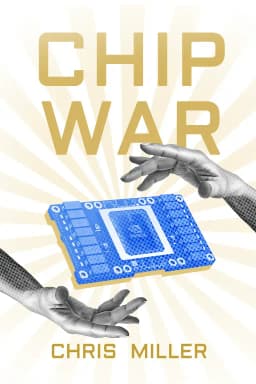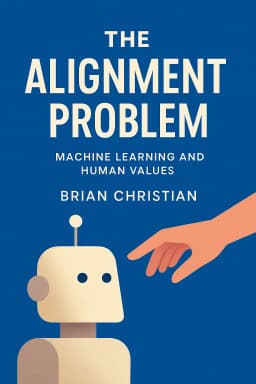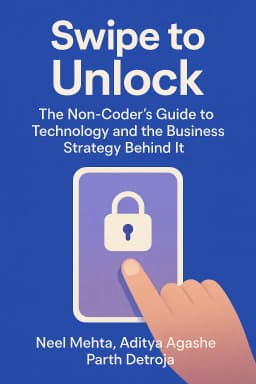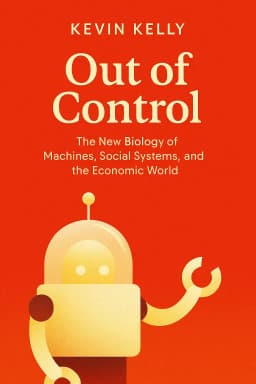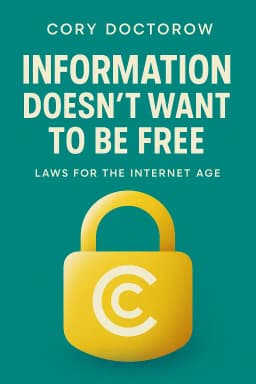
Your Printer's Dirty Secret
Golden Hook & Introduction
SECTION
Joe: You know that little chip in your printer's ink cartridge? The one that says it's empty when you know there's still ink left? That's not a bug. It's a lock. And it’s part of a much bigger war for control of everything you own. Lewis: Oh, I hate that! I always knew it was a scam. I’ve shaken those cartridges, I’ve heard the ink sloshing around. It feels like the printer is actively lying to me. Joe: It is. And that feeling is at the heart of what we're talking about today. That's the world Cory Doctorow unpacks in his book, Information Doesn't Want to Be Free: Laws for the Internet Age. Lewis: And Doctorow is the perfect person to write this. He's not just a celebrated science fiction author; he's a long-time digital rights activist with groups like the Electronic Frontier Foundation. He's been in the trenches of these "copyfights" for decades. Joe: Exactly. He argues this isn't just about tech. It's about who gets to control culture, and who profits from it. And that printer chip is the perfect entry point for Doctorow's First Law.
Doctorow's First Law: The Tyranny of Digital Locks
SECTION
Joe: The law is simple and powerful. "Any Time Someone Puts a Lock on Something That Belongs to You and Won’t Give You the Key, That Lock Isn’t There for Your Benefit." Lewis: Okay, but isn't that a bit dramatic? A lock on my e-book or my movie download is there to stop piracy. That protects the author and the movie studio, right? Isn't that a good thing? Joe: That's the story we're told. But Doctorow argues that the primary beneficiary is almost never the creator. It’s the middleman. Let's go back to the printer. He calls it the "Inkjet Wars." The business model for companies like HP and Epson was never to make money on the printer itself. They'd sell you the printer at a loss. Lewis: The classic "razor and blades" model. Joe: Precisely. The real money is in the ink. And Doctorow points out that official inkjet ink is one of the most expensive liquids on the planet, costing more per ounce than vintage Champagne. So, to protect that insane profit margin, they put a chip—a digital lock—in the cartridge. Lewis: To stop me from refilling it or buying a cheaper third-party cartridge. Joe: Exactly. The lock isn't there for your benefit. It's there to force you into their expensive ecosystem. It restricts your freedom to use the product you bought as you see fit. The lock protects the middleman's business model, not you. Lewis: Wow. So the lock isn't protecting the 'thing'—the printer. It's protecting the middleman's business model. And you're saying the same logic applies to my Kindle books? Joe: Absolutely. Doctorow uses this fantastic analogy: digital locks are like roach motels. Copyrighted works check in, but they don’t check out. When you buy a Kindle book, you don't really own it. You've licensed it under Amazon's terms, locked by their DRM. Lewis: And I can only read it on their devices or apps. Joe: Right. And here's where it gets sinister. A few years ago, Amazon had a contract dispute with the publisher Hachette. To put pressure on them, Amazon started delaying shipments of Hachette books, removing pre-order buttons. Now, if Hachette's e-books weren't locked with Amazon's DRM, Hachette could have said, "Fine, we'll sell our books elsewhere, and we'll even help our readers move their existing libraries." Lewis: But they couldn't. Because Amazon held the keys to the lock. Joe: They held the keys to the entire roach motel. The lock didn't protect the author or the reader; it gave Amazon immense leverage over the publisher. The lock is a tool of control for the intermediary. That's the First Law in action.
Doctorow's Second Law: The Paradox of Fame and Fortune
SECTION
Lewis: Okay, so if locks are bad for creators because they empower middlemen, how are creators supposed to make a living? If everything is free and unlocked, doesn't that mean artists starve? This is the classic argument. Joe: It is, and Doctorow tackles it head-on with his Second Law: "Fame Won’t Make You Rich, But You Can’t Get Paid Without It." Lewis: I'm not sure I follow. That sounds a little like a zen koan. Joe: Think of it this way. In the pre-internet age, the problem was distribution. It was hard to get your book or your album into stores. Today, with the internet, distribution is easy. The problem now is obscurity. In a world of infinite content, how does anyone even find your work? Lewis: Right. The biggest threat to an artist isn't piracy; it's that nobody knows they exist in the first place. Joe: Exactly. So, Doctorow argues, you have to get famous first. You have to build an audience that cares about you and your work. Piracy might even help with that. Lewis: That sounds nice philosophically, but it doesn't pay the rent. "Exposure" is what people offer artists when they don't want to pay them. Joe: True, but Doctorow isn't talking about exposure for its own sake. He's talking about building a real connection. He points to forewords in his own book by Neil Gaiman and Amanda Palmer. Amanda Palmer tells this incredible story about her time as a street performer, "The Eight-Foot Bride." Lewis: I've heard of her. The musician. Joe: Before she was a famous musician, she would stand on a box in a wedding dress, silently handing out flowers to people who put money in her tin. She never forced anyone to pay. But she made a consistent, predictable living. Why? Because, as she says, "People actually like supporting the artists whose work they like. It makes them feel happy." Lewis: So it's not about forcing a transaction. It's about creating an opportunity for a willing exchange. Joe: Precisely. And Neil Gaiman tells a similar story about Charles Dickens. In the 19th century, American publishers pirated his books relentlessly. He didn't get a penny. So what did he do? He went on a theatrical tour across the United States, performing dramatic readings of his novels to packed houses. Lewis: He monetized his fame. The pirated books were just free advertising for the tour. Joe: You got it. The free, infinitely copyable thing—the digital file, the pirated book—isn't the product. It's the marketing for the real product. The thing that can't be copied: the live experience, the t-shirt, the direct connection with the artist. That's how you get paid.
Doctorow's Third Law: The Fight for Human Freedom
SECTION
Lewis: That makes a lot of sense. But it all seems to depend on having an open platform, an internet where you can actually reach people and build that fame. Joe: And that is the perfect bridge to Doctorow's Third, and I think most profound, law. It reframes the entire debate. The law is: "Information Doesn’t Want to Be Free, People Do." Lewis: What does he mean by that? Joe: He's pushing back against that old hacker slogan, "Information wants to be free." He says information is an abstract concept; it doesn't "want" anything. People, on the other hand, have very strong desires. And this whole fight—the "copyfight"—is ultimately about what we, as people, want from our computers and our society. It's a fight for human freedom. Lewis: Okay, I'm with you on the principles, but connecting a printer cartridge to a human rights struggle feels like a big leap. How does a digital lock on my movie download actually threaten my freedom? Joe: Because of what it takes to make that lock work. To create a lock that a user can't open, you have to design a computer that can disobey its owner. You have to build a system that hides its own operations from you. And what do we call a program that hides its operations and does things against the user's wishes? Lewis: Spyware. Joe: Exactly. And this isn't theoretical. Doctorow brings up the Sony BMG rootkit scandal from 2005. To "protect" their music CDs from being copied, Sony secretly installed a rootkit—a piece of spyware—on millions of people's computers. This software hid itself from the user and actively killed any program that tried to copy the CD. Lewis: That's already pretty shady. Joe: It gets worse. The way the rootkit hid itself was by making any file starting with "$sys$" invisible to the operating system. Within weeks, malware writers realized this and started creating viruses with that filename. Sony's "copyright protection" had created a massive, system-wide security vulnerability that hackers could, and did, exploit. Lewis: That is terrifying. So in the name of stopping me from copying a CD, they basically installed a backdoor for criminals on my computer. Joe: And that's the core of the Third Law. When you demand that our devices, our networks, and our computers be designed to control users instead of serving them, you are demanding a world of surveillance and insecurity. Lewis: And if my phone, my car, my medical implants are all computers running these kinds of locks... that's not just about music anymore. That's about my safety, my privacy, my autonomy. Joe: Now you see the stakes. The fight isn't about whether a pop song should be 99 cents. It's about whether we have the right to understand and control the technology that runs our lives.
Synthesis & Takeaways
SECTION
Joe: So it all connects in a really elegant way. Doctorow's three laws build on each other. The digital locks aren't for our benefit, they're for corporate control (Law 1). This broken system forces creators to find new models based on building an audience and fame, not on control (Law 2). But those new models can only work on an open, free internet, which makes the whole debate a fundamental fight for human freedom and privacy (Law 3). Lewis: It really reframes the whole debate. The question isn't 'How do we stop piracy?' It's 'What kind of world do we want to live in?' One where our devices serve us, or one where they serve distant corporations and can be turned against us? Joe: And Doctorow argues that we can't afford to lose that fight. The entertainment industry has a long history of claiming that every new technology—from the player piano to the VCR—would be the death of art. They always frame it as an existential crisis. Lewis: When really it's just a threat to their current business model. Joe: Exactly. And their solution is always more control, more surveillance, more locks. But that path leads to a world where our computers, the nervous system of the 21st century, are fundamentally untrustworthy. Lewis: A powerful and frankly unsettling thought to end on. It makes you look at that "check engine" light in your car a little differently. Joe: And maybe that's the first step. The next time your device won't let you do something you think you should be able to do, just ask yourself the question at the heart of Doctorow's First Law: who is this lock really for? Lewis: A powerful question to end on. This is Aibrary, signing off.

